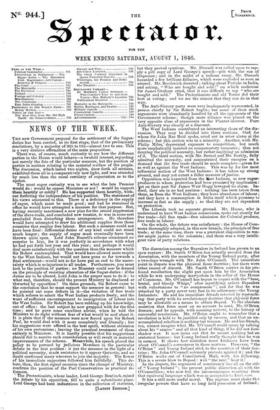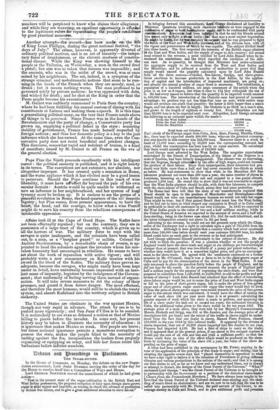The dissension among the Repealers in Ireland has grown to
an open rupture: Mr. Smith O'Brien has actually seceded from the Association, with the members of the Young Ireland party, after a two-days wrangle with Mr. John O'Connell. The immediate point in dispute was the physical force doctrine ; but there were other causes of discord. Mr. Smith O'Brien carries in his pro- found recollection the slight put upon him by the Association while he was undergoing martyrdom in the cellar of the House of Commons. Mr. O'Connell has begun to coquet with the "base, brutal, and bloody Whigs," after mystifying ardent Repealers with exhortations to "no compromise "; and for that he was attacked by a party never very fast in its adherence—the Young Irelanders. He and his immediate friends retorted by reproach- ing that party with its revolutionary doctrine that physical force may be allowable as a means to obtain Repeal. To the absolute assertion that force must on no account be used, Mr. O'Brien demurs ; and he appeals, with amusing naïveté, to the history of successful revolutions. Mr. O'Brien ought to remember that a revolution is held to be justified only by success, and that an un- accomplished rebellion is nothing but treason. Ile and his friends, too, cannot imagine what Mr. O'Connell could mean by talking about his " armies " and all that kind of thing, if lie did not fore- shadow war. It now turns out that he meant nothing but an oratorical licence : but Young Ireland really thought that he was in earnest. It shows how mistaken some Irishmen have been about O'Connell's earnestness in those matters. However, " the O'Brien" and Young Ireland stick to the assertion of their doc- trine; Mr. John O'Connell solemnly protests against it ; and the O'Brien walks out of Conciliation Hall, with his following. This is a severe blow to Repeal : will " the rent" bear it?
In the dispute, the argument of consistency lies all on the side of "Young Ireland " ; the present politic discretion all with the O'Connellites; who now feel the inconveniences resulting from that equivocal language which was so acceptable to Irish ears. It has a still more useful moral. The rupture must shake th e irregular powers that have so long held possession of Ireland ;
numbers will be perplexed to know who claims their allegiance ; and while they are wavering, an excellent ojiportunity is afforded to the legitimate rulers for repurchisIng tha'people's confidence- by good practical measures.



























